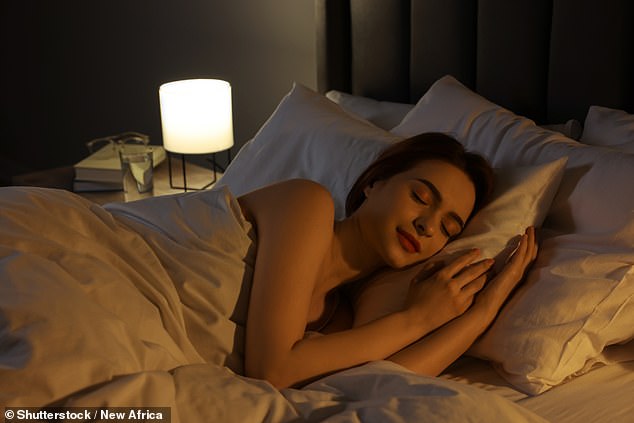The best times to brush your teeth, eat breakfast and go to the gym… and why it’s good for your health
While some people stick to a strict daily schedule, others go with the flow and refuse to commit to a routine.
While what you do is a personal preference, research shows there may be a right way to spend your day.
Experts and scientists claim that there are a number of precise times you should adhere to every day, from the exact time you should set your alarm to the time you should eat.
How many optimal opportunities do you miss within 24 hours?
Read on for the full list of timings you can implement into your routine.
Experts and scientists claim that from the exact time you should set the alarm to the time you should eat, there are some precise times you should stick to day after day (stock image)
Set an alarm – 7:22 am
The first, and perhaps one of the most important things, that most people try to get right is the time they set their alarm to wake up.
A University of Westminster study found that those who wake between 5:22 a.m. and 7:21 a.m. have higher levels of stress hormones than people who wake up later.
They also appeared to be more sensitive to a bad mood, muscle pain, colds and headaches.
Dr. Neil Stanley, an independent sleep expert, claims that while getting up at 7 a.m. is good for most people, “a recent study shows that the most important thing for longevity is consistency of wake time,” reports The Telegraph.
So it’s not so much about the time you choose, but more about whether you stick to it every day. The expert says we should wake up at the same time, plus or minus an hour, even on weekends.
Have breakfast – before 8am
After you get out of bed, researchers claim that the best time to eat something is before 8 a.m.
A study last year found that eating breakfast after 9am increases the risk of developing type 2 diabetes by 59% compared to those who eat their first meal of the day before 8am.
Another study also found that if you eat breakfast at 9 a.m., you are 6% more likely to develop cardiovascular disease than people who eat at 8 a.m.
Anna Palomar Cros, a researcher at the Barcelona Institute for Global Health, told the paper: ‘We know that the timing of meals plays a key role in regulating circadian rhythm and glucose and lipid control.’

After getting out of bed, researchers claim the best time to eat something is before 8 a.m. (stock image)
Brush your teeth – before eating
The age-old debate about whether you should brush your teeth before or after breakfast has been preoccupying the British for years.
And according to dentist Dr. Shaadi Manouchehri, this is the first option. She explains that you can remove the enamel from your teeth by brushing after you eat.
If we add that when we eat, our natural bacteria breaks down, it produces acid to break down the sugar in food.
So if you brush your teeth quickly after eating, you “rub that acid over the teeth” and wear them down.
Drinking coffee – between 9am and 2pm
This is bad news for early risers, because it turns out that the optimal time to drink coffee is between 9 a.m. and 2 p.m.
Your alertness is related to cortisol production, which peaks on average between 8:00 and 9:00 am.
The caffeine in coffee should give your cortisol a boost, but it’s already high early in the morning, so you may not get the boost you want.
Avoiding coffee after 2pm is also a good idea as it can take up to eight hours for the caffeine to wear off, but of course this depends on when you go to sleep.

This is bad news for early risers, as it turns out the optimal time to drink coffee is between 9am and 2pm (stock image)
Training – from 6:30 AM to 8:30 AM or from 6:00 PM to 8:00 PM
When it comes to fitting a workout in, most people struggle to squeeze one into work hours, as early morning and late evening are favorable.
This is good because an American study has shown that training between 6:30 am and 8:30 am reduces blood pressure and abdominal fat in women.
Likewise, sweating between 6:00 PM and 8:00 PM will help build muscle and improve endurance.
For men, on the other hand, evening workouts appear to be the most valuable for lowering blood pressure and burning fat, reports The Telegraph.
Making an important decision – 11am to 12pm
Scientists argue that there is even an optimal time to make a decision or ask someone for a favor.
So if you have something on your mind lately, use the hour between 11am and 12pm as your thinking time.
Professor Russell Foster, a neuroscientist at the University of Oxford, says that our cognitive ability and reaction time are at their highest between 11am and 12pm.
It’s also when our mood is at its best, so it’s the best time to get the answer you want from someone.

An American study has shown that training between 6:30 and 8:30 a.m. lowers blood pressure and belly fat in women (stock image)
Sleeping – between 12:00 and 16:00
The best time to have some quiet time during the day is in the afternoon, especially between noon and 4 p.m.
A Japanese study found that a 20-minute nap at 12:20 p.m. can keep your afternoon energy from diminishing.
Napping during the day can also help seniors stay mentally sharp by reducing brain shrinkage.
From the age of 35, the brain shrinks by 0.2 to 0.5 percent per year, and even more after the age of 60.
But one study suggests that people who habitually nap during the day have greater brain volume, meaning their brains may shrink less over time.
Dinner – 7:00 PM to 8:00 PM
Between 7:00 PM and 8:00 PM is the optimal time to eat your last meal of the day.
Eating later can increase your risk of weight gain and diabetes. Scientists in Spain have found that those who eat within two hours of going to bed are five times more likely to become obese than those who eat early.
Dr. Stanley told The Telegraph: ‘We have to lose one degree of body temperature to fall asleep.
‘Burning calories creates heat, so a late big meal will warm you up when you should be cooling down. Ideally, you should eat no later than three hours before going to bed.’

Research described in the European Heart Journal shows that falling asleep between 10pm and 11pm is the best time as it can reduce the risk of cardiovascular disease, compared to those who go to sleep later (stock image)
Going to sleep – 10pm to 11pm
Finally, the last task of the day that you need to time correctly is wrapping up for the evening and going to sleep.
Research described in the European Heart Journal says falling asleep between 10pm and 11pm is the best time as this can reduce the risk of cardiovascular disease, compared to those who go to sleep later.
Those who hit the hay after midnight have a 25% higher risk of heart attack and stroke.
According to several studies, seven hours is the optimal amount of time you should sleep.
Research has long shown that those who sleep between six and eight hours a day are less likely to develop a host of diseases – and even live longer.
However, one study also claims that maintaining a consistent sleep routine could be more beneficial than staying asleep longer.
